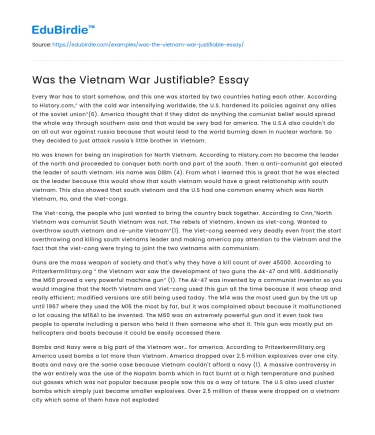Introduction
The Vietnam War, a protracted conflict from 1955 to 1975, remains one of the most contentious and debated wars in modern history. Rooted in the Cold War dynamics, the United States' involvement was primarily motivated by the desire to contain the spread of communism, a doctrine that had already entrenched itself in Eastern Europe and China. The war's justification has been the subject of intense scrutiny, with arguments spanning moral, political, and strategic dimensions. This essay seeks to critically analyze the justifiability of the Vietnam War by examining the rationale behind U.S. intervention, the ethical implications of military actions, and the broader geopolitical consequences. Through this analysis, we will assess whether the objectives that drove the war effort were sufficient to warrant the immense human and economic costs incurred.
U.S. Intervention: Strategic Necessity or Overreach?
The United States' involvement in Vietnam was largely predicated on the Domino Theory, which posited that the fall of one Southeast Asian country to communism would precipitate the fall of its neighbors. This perspective was articulated by President Dwight D. Eisenhower in 1954, who argued that the "loss of Indochina would cause the fall of Southeast Asia like a row of dominoes." From this standpoint, American intervention was framed as a critical measure to prevent the spread of communism and maintain global power balance. However, critics argue that this theory was an overreach, rooted in an exaggerated perception of the communist threat. Historian George Herring suggests that the Domino Theory underestimated the nationalist aspirations of the Vietnamese people, who were primarily motivated by the desire for independence rather than ideological alignment with global communism. The strategic rationale, while seemingly compelling, neglected the complex socio-political landscape of Vietnam, leading to a protracted and unanticipated conflict.
Moreover, the escalation of military involvement, highlighted by the Gulf of Tonkin Incident in 1964, raises questions about the legitimacy of the war's initiation. The incident, which involved reported attacks on U.S. ships by North Vietnamese forces, bolstered Congressional support for the Gulf of Tonkin Resolution, effectively granting President Lyndon B. Johnson broad war powers. Yet, declassified documents later revealed that the facts surrounding the incident were misrepresented, casting doubt on the war's legitimacy. This misrepresentation underscores the problematic nature of the U.S. intervention, calling into question whether it was a strategic necessity or a manifestation of Cold War paranoia.
Ethical Implications and Human Cost
The ethical implications of the Vietnam War are profound, particularly concerning the conduct of military operations and their impact on civilian populations. The widespread use of napalm and Agent Orange, chemical agents deployed to destroy vegetation and enemy cover, had devastating effects on both the environment and human health. As noted by the International Red Cross, these chemicals caused long-term health issues, including cancer and birth defects, affecting millions of Vietnamese civilians. Such tactics raise ethical concerns about the proportionality and necessity of force used during the conflict. The Geneva Conventions, which outline the humanitarian treatment of civilians during war, appear to have been disregarded, leading to accusations of war crimes against the United States.
In addition to environmental and health consequences, the war resulted in significant loss of life. Estimates suggest that over 3 million Vietnamese and more than 58,000 Americans died as a result of the conflict. The scale of casualties, combined with the immense suffering experienced by civilians, challenges the moral justification of the war. Philosopher Michael Walzer, in his work "Just and Unjust Wars," argues that the principle of jus in bello, which governs the conduct of war, was violated due to the indiscriminate violence and lack of distinction between combatants and non-combatants. These ethical lapses suggest that the human cost of the Vietnam War far outweighed any strategic gains, casting doubt on its overall justifiability.
Geopolitical Consequences and Legacy
The geopolitical consequences of the Vietnam War extend beyond its immediate impact, influencing U.S. foreign policy and international relations for decades. The war's outcome, marked by the eventual withdrawal of American forces and the fall of Saigon in 1975, signaled a significant setback for U.S. efforts to contain communism. This outcome demonstrated the limitations of military intervention in achieving ideological goals, prompting a reevaluation of U.S. foreign policy strategies. The Vietnam Syndrome, a term coined to describe the American public's aversion to overseas military interventions, emerged as a direct consequence of the war, influencing subsequent conflicts such as the Gulf War and the Iraq War.
Furthermore, the war had profound effects on Vietnamese society and the broader Southeast Asian region. The reunification of Vietnam under communist control did not result in the regional domino effect feared by U.S. policymakers, challenging the initial justification for intervention. Instead, Vietnam's subsequent economic reforms and integration into the global economy suggest that the perceived communist threat was not as dire as initially believed. As political scientist Robert McNamara, who served as Secretary of Defense during the war, later reflected, "We were wrong, terribly wrong." This acknowledgment underscores the flawed assumptions that underpinned the war effort, highlighting the need for a nuanced understanding of local dynamics in international interventions.
Conclusion
The justifiability of the Vietnam War remains a complex and multifaceted issue, encompassing strategic, ethical, and geopolitical dimensions. While the initial rationale for U.S. intervention was framed by the desire to contain communism, the subsequent conduct of the war and its human and geopolitical costs challenge the validity of this justification. The ethical implications, particularly concerning civilian harm and the use of chemical agents, further undermine the war's legitimacy. Ultimately, the Vietnam War serves as a cautionary tale about the dangers of oversimplified foreign policy doctrines and the need for critical engagement with the socio-political contexts of international conflicts. As historians and policymakers continue to assess the war's legacy, it is imperative to learn from its lessons to avoid repeating similar mistakes in future interventions.






 Stuck on your essay?
Stuck on your essay?

